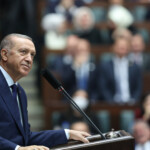“Current tensions between Greece and Turkey have historical precedent, but must also be understood as part of a scorched-earth foreign policy on behalf of Recep Tayyip Erdogan, who has his own reasons for ratcheting up mistrust between the two countries. Hercules Millas offers some perspective on what we may expect following the upcoming Turkish election.“
Bilateral relations between Turkey and Greece are influenced by two factors: The basic one has a historical and ideological dimension; the other is conjectural and it is based either on ephemeral moods and/or short term political expediencies. In both cases the official argumentation is always the “national interest” of each country. The first factor is loaded with grievances about the past and the present, and the second with fear and agony about the future, with a lot of mutual mistrust.
The leaderships of each country naturally play a role, but that is secondary. Despite the appearance of opinionated politicians in the arena the last few decades, their role has not been decisive. This kind of a situation is called a frozen conflict.
The recent earthquakes in Turkey have led to hopes for improved relations, but past disappointments warrant some reservation. Upcoming general elections in both countries are also likely to trigger new directions. What can one foresee and how optimistic can one be?
Turkey for the first time in its history as a republic has strained its relations with many countries: with its neighbors Armenia, Iraq, Syria, Cyprus, Israel, Egypt, and Greece as well as with the United States, France, Finland, Sweden, and with NATO and EU in general. What are the chances that Greece, of all these countries, will be the first to improve its relations with Turkey? It is more realistic that Turkey and Greece will improve bilateral relations as part of a general rapprochement between Turkey and the “world.” A change in Turkish foreign policy in general is a more realistic approach to its problems with Greece, rather than expecting a solution to the specific problems between Greece and Turkey.
What has changed in Turkey in the last decade—and this is reflected in Greece-Turkey relations—is that the usual state of tension between Greece and Turkey has turned into a “regime for survival” policy for R.T. Erdoğan. The populist discourse of “foreign threats” and “enemies” has been instrumentalized to unite the electoral body around a “strong leader.” It may be that Erdogan’s real target is this state of “non-solution”—rather than what’s best for the national interest.
Turkey has, however, made some recent inroads toward ameliorating tensions with some of its “enemies,” markedly Israel and Egypt. The earthquakes seem to have sped up these efforts. For example, the Greek and Turkish foreign ministers exchanged friendly messages. Fewer Turkish planes now fly over the Aegean. Turkish television analysts who have, for the last two years, explained to audiences how Greece will lose the “probable” war against Turkey, have disappeared from the mass media.
Two developments allow for some optimism. Irrespective of the results of the presidential and parliamentary elections in Turkey, their winner will no longer need an “enemy,” at least for a period of time. On the contrary, peace and a feeling of security will be more advantageous, especially for the Turkish economy. Secondly, the policy of coercion did not prove effective: Greece counteracted by drastically boosting its military collaboration with the U.S. and increasing its defense spending.
The pessimist will point out that resolving bilateral disputes requires compromises, something that has not been seen in any political or social space in Greece and especially in Turkey in recent years. Concessions are perceived in both societies as traitorous acts, and this almost precludes any step towards an agreement that would transcend the deadlock.
In short, the best we can hope for at the moment is a return to more mild and controlled frozen conflicts—that is, business as usual. All of this rests on the hope that the presidential elections in Turkey do not trigger any unconstitutional developments with unforeseen consequences.
The views and opinions expressed above are the author’s and do not reflect those of the Free Turkish Press.


